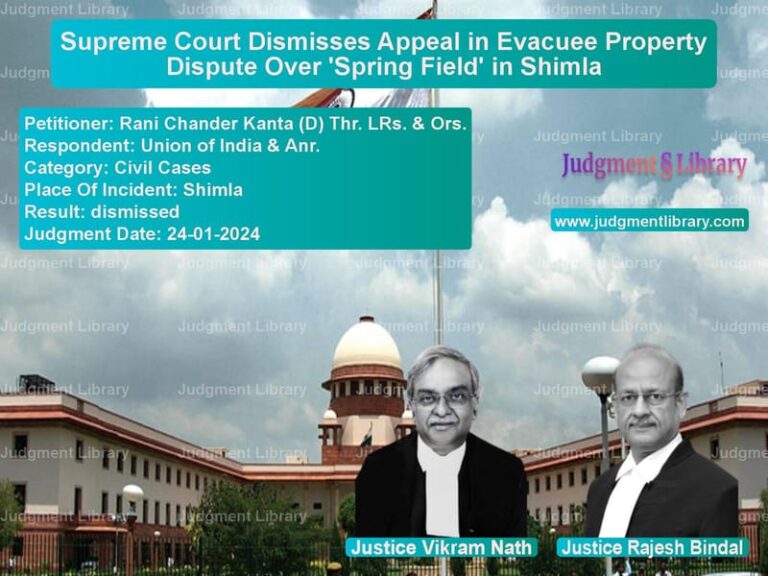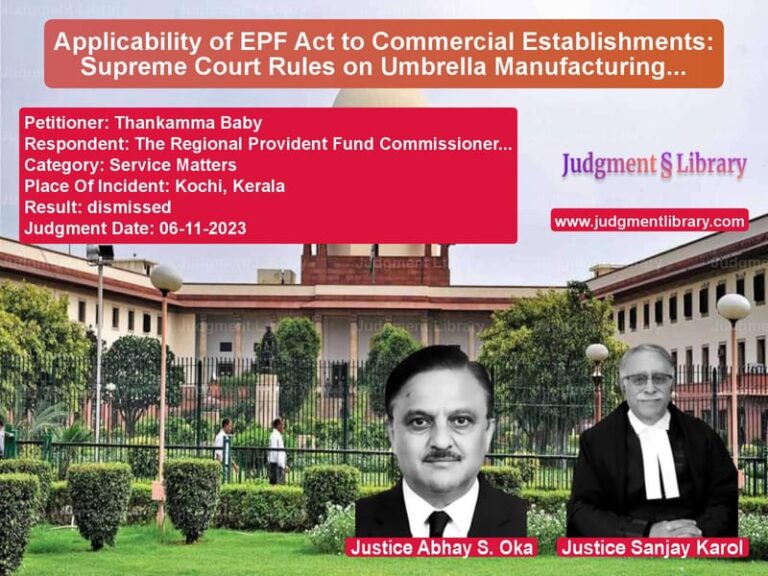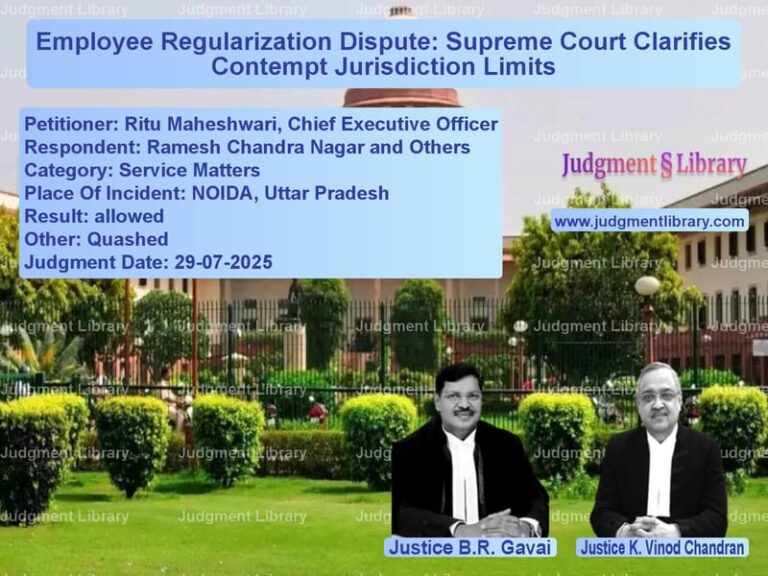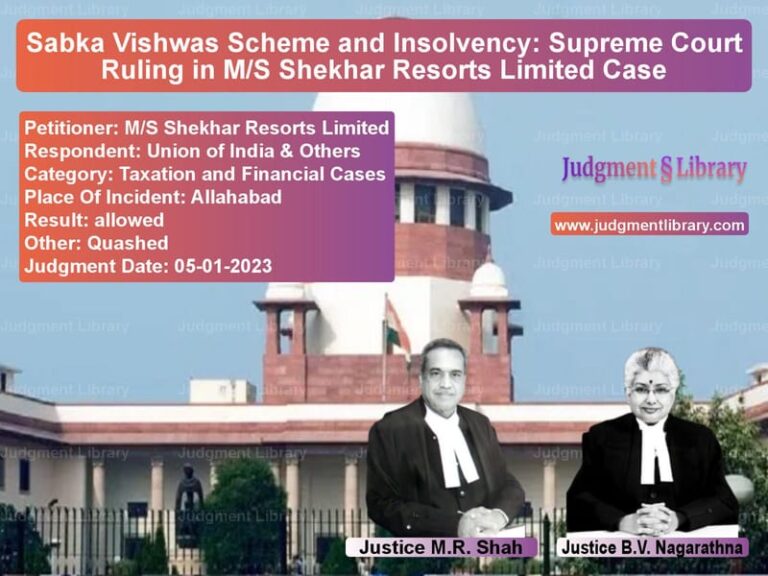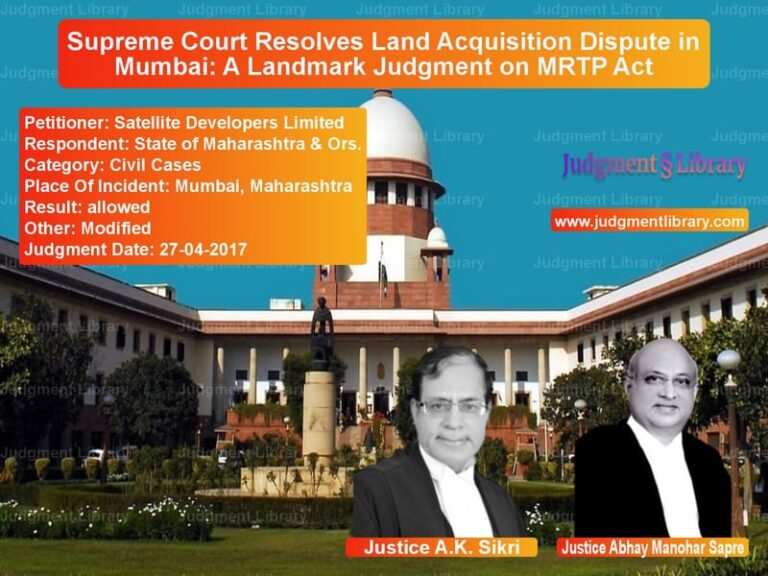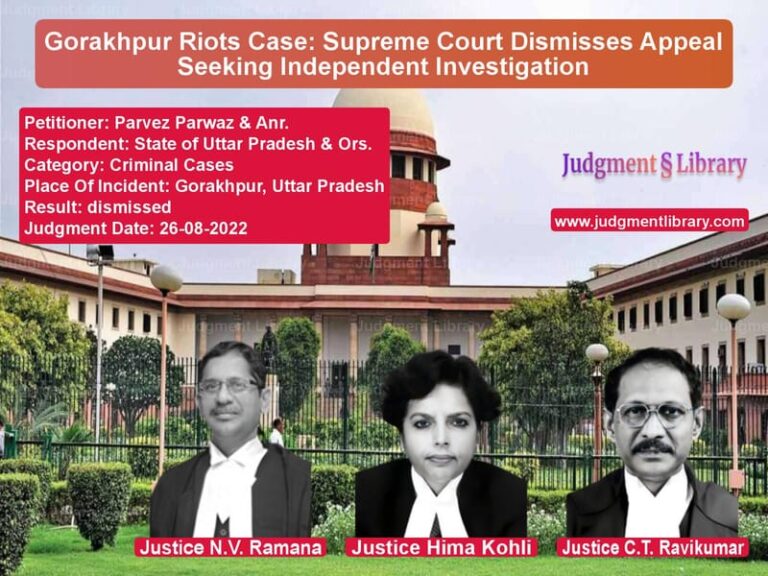Supreme Court Upholds Appointment of Candidate in Food Corporation of India Recruitment Dispute
The Supreme Court of India, in its judgment dated April 9, 2019, upheld the decision of the Delhi High Court directing the Food Corporation of India (FCI) to consider the appointment of Rimjhim for the post of Assistant Grade-II (Hindi). The ruling affirmed that a candidate’s eligibility should not be disregarded merely due to procedural lapses, provided they fulfill all essential criteria.
Background of the Case
FCI invited applications for the post of Assistant Grade-II (Hindi) through an advertisement published on February 14, 2015. The respondent, Rimjhim, applied for the post and appeared in the written test held on October 4, 2015. She secured the sixth rank in the merit list and was called for document verification. However, her name did not appear in the final selection list published on May 2, 2016.
Upon inquiry, she was informed that her candidature was rejected due to the absence of a certificate proving one year’s experience in translation from English to Hindi and vice versa, which was an essential requirement as per the advertisement. Rimjhim subsequently produced experience certificates, but her request for reconsideration was denied by FCI.
Legal Proceedings
Aggrieved by FCI’s decision, Rimjhim filed a writ petition before the Delhi High Court. The Single Judge dismissed her petition, holding that she failed to meet the eligibility criteria due to non-submission of the requisite experience certificate at the appropriate stage.
She appealed the decision before the Division Bench, which ruled in her favor, directing FCI to reconsider her case. The Division Bench noted that she had the requisite experience and that FCI had erred in rejecting her candidature.
FCI, dissatisfied with the High Court’s ruling, challenged the decision before the Supreme Court.
Petitioner’s (FCI’s) Arguments
- One year’s experience in translation was a mandatory requirement, and the respondent failed to provide proof at the required stage.
- Allowing candidates to submit experience certificates after the selection process would compromise the integrity of recruitment procedures.
- The advertisement explicitly mentioned that all eligibility conditions must be met at the time of application.
- The certificates subsequently produced by Rimjhim were not presented during document verification and should not be considered.
Respondent’s (Rimjhim’s) Arguments
- She met all eligibility requirements and merely failed to submit the experience certificate at the initial stage.
- The advertisement did not specifically mandate submission of experience proof along with the application.
- During document verification, FCI did not inform her that her candidature would be rejected due to the absence of the experience certificate.
- The certificates she later provided were genuine, and FCI did not dispute their authenticity.
Supreme Court’s Observations
The Supreme Court upheld the High Court’s ruling, making the following key observations:
- The advertisement did not explicitly require submission of experience proof along with the application.
- The respondent had the required experience at the relevant time; non-submission of the certificate at the initial stage was a procedural lapse, not a disqualification.
- Clause 33 of the advertisement allowed the employer to call for additional documents to verify eligibility.
- FCI failed to exercise its discretion to seek further proof of experience during document verification.
Judicial Precedents Cited
- Charles K. Skaria v. Dr. C. Mathew (1980) 2 SCC 752 – Distinguished between essential requirements and proof thereof.
- Dolly Chhanda v. Chairman, JEE (2005) 9 SCC 779 – Held that procedural delays in submitting documents should not defeat a meritorious candidate’s claim.
Final Judgment
The Supreme Court ruled:
“The Division Bench of the High Court has rightly observed that non-production of the experience certificate along with the application cannot be considered a fatal defect, particularly when the respondent possessed the required experience at the relevant time. Accordingly, we dismiss the appeal and direct FCI to reconsider the respondent’s appointment on merits.”
Impact of the Judgment
This ruling has significant implications for recruitment processes:
- Candidate-Friendly Interpretation: Ensures that technical lapses do not deprive deserving candidates of employment.
- Discretion of Employers: Encourages organizations to seek clarifications rather than outright rejecting candidates over documentation issues.
- Fairness in Selection: Reinforces that eligibility should be determined substantively, rather than based on procedural technicalities.
Conclusion
The Supreme Court’s ruling in Food Corporation of India v. Rimjhim underscores the principle that recruitment processes should focus on substantive eligibility rather than rigid procedural formalities. The judgment ensures fairness in public employment and prevents undue hardship to meritorious candidates.
Petitioner Name: Food Corporation of India.Respondent Name: Rimjhim.Judgment By: Justice L. Nageswara Rao, Justice M.R. Shah.Place Of Incident: Delhi.Judgment Date: 09-04-2019.
Don’t miss out on the full details! Download the complete judgment in PDF format below and gain valuable insights instantly!
Download Judgment: Food Corporation of vs Rimjhim Supreme Court of India Judgment Dated 09-04-2019.pdf
Direct Downlaod Judgment: Direct downlaod this Judgment
See all petitions in Recruitment Policies
See all petitions in Public Sector Employees
See all petitions in Employment Disputes
See all petitions in Judgment by L. Nageswara Rao
See all petitions in Judgment by Mukeshkumar Rasikbhai Shah
See all petitions in dismissed
See all petitions in supreme court of India judgments April 2019
See all petitions in 2019 judgments
See all posts in Service Matters Category
See all allowed petitions in Service Matters Category
See all Dismissed petitions in Service Matters Category
See all partially allowed petitions in Service Matters Category


